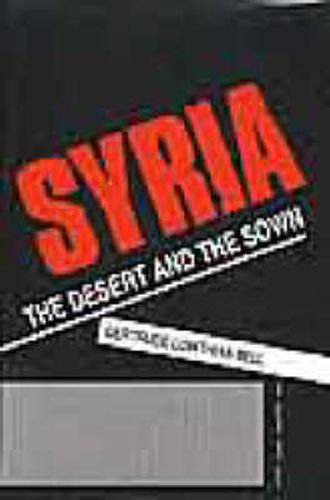Readings Newsletter
Become a Readings Member to make your shopping experience even easier.
Sign in or sign up for free!
You’re not far away from qualifying for FREE standard shipping within Australia
You’ve qualified for FREE standard shipping within Australia
The cart is loading…






This title is printed to order. This book may have been self-published. If so, we cannot guarantee the quality of the content. In the main most books will have gone through the editing process however some may not. We therefore suggest that you be aware of this before ordering this book. If in doubt check either the author or publisher’s details as we are unable to accept any returns unless they are faulty. Please contact us if you have any questions.
Syria: The Desert and the Sown presents a unique and sensitive picture of the Syrian people whilst under the rule of the Ottoman Empire. Originally published in 1907, the book studies the effects of western cultural advancements in the area, as the devastating upheavals of the First World War were yet to come. Syria was then: ‘merely a geographical term corresponding to no national sentiment in the breasts of the inhabitants’, Lady Bell writes. Syria was infinitely divided into sects, castes and tribes, each following their own age-old customs and laws. Various Arab-speaking races were prevented from waging constant war on one another only by ‘the ragged half fed soldier who draws at rare intervals the Sultan’s pay’.
Bell attempts to see deny her orientalist tendencies by envisioning her experience through the eyes of an Arab nomad. She becomes aware that the desert ‘is set thicker with human associations than any city. Every line of it took on significance, every stone was like the ghost to a hearth in which the warmth of Arab life was hardly cold, though the fire might have been extinguished this hundred years’.
Her sympathy with the people she meets, and her respect for their traditions, raises Syria: The Desert and the Sown well above the ordinary travel book. The strong sense of history conveyed by the writing is reinforced by the author’s own photographs of ruins, including temples and shrines on the ancient roads between Jerusalem and Antioch.
$9.00 standard shipping within Australia
FREE standard shipping within Australia for orders over $100.00
Express & International shipping calculated at checkout
This title is printed to order. This book may have been self-published. If so, we cannot guarantee the quality of the content. In the main most books will have gone through the editing process however some may not. We therefore suggest that you be aware of this before ordering this book. If in doubt check either the author or publisher’s details as we are unable to accept any returns unless they are faulty. Please contact us if you have any questions.
Syria: The Desert and the Sown presents a unique and sensitive picture of the Syrian people whilst under the rule of the Ottoman Empire. Originally published in 1907, the book studies the effects of western cultural advancements in the area, as the devastating upheavals of the First World War were yet to come. Syria was then: ‘merely a geographical term corresponding to no national sentiment in the breasts of the inhabitants’, Lady Bell writes. Syria was infinitely divided into sects, castes and tribes, each following their own age-old customs and laws. Various Arab-speaking races were prevented from waging constant war on one another only by ‘the ragged half fed soldier who draws at rare intervals the Sultan’s pay’.
Bell attempts to see deny her orientalist tendencies by envisioning her experience through the eyes of an Arab nomad. She becomes aware that the desert ‘is set thicker with human associations than any city. Every line of it took on significance, every stone was like the ghost to a hearth in which the warmth of Arab life was hardly cold, though the fire might have been extinguished this hundred years’.
Her sympathy with the people she meets, and her respect for their traditions, raises Syria: The Desert and the Sown well above the ordinary travel book. The strong sense of history conveyed by the writing is reinforced by the author’s own photographs of ruins, including temples and shrines on the ancient roads between Jerusalem and Antioch.